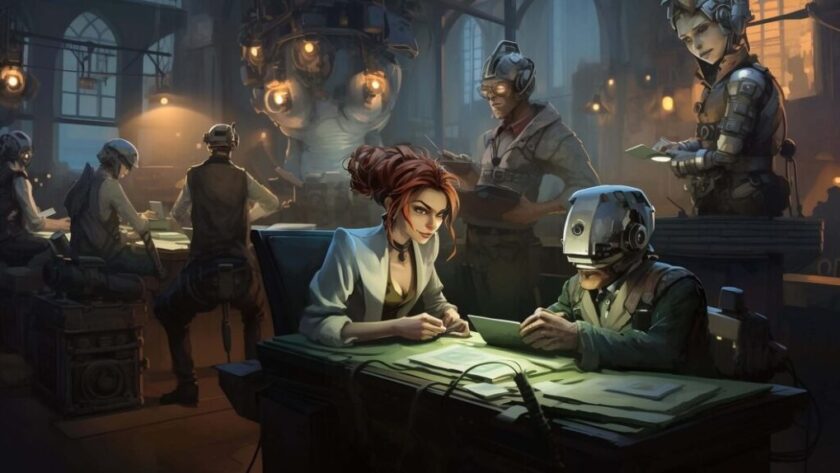The world of video games has evolved tremendously since its inception. From simple arcade titles to highly sophisticated virtual worlds, games have transformed from being a source of entertainment to an intricate blend of art, narrative, and interactivity. One of the most significant shifts in modern gaming is the increasing emphasis on storytelling. No longer limited to a basic plot or a series of objectives, today’s games immerse players in rich, emotionally charged narratives that rival those of books and films. But what is the role of storytelling in modern games, and how does it shape the gaming experience? In this article, we will explore the importance of storytelling in video games, how it influences gameplay, and why it has become a core element in the gaming world.
The Evolution of Storytelling in Video Games
In the early days of video games, storytelling was rudimentary at best. The plots were often simple and one-dimensional, with the main goal being to entertain through gameplay mechanics rather than narrative depth. Games like Pong or Space Invaders were designed for quick bursts of fun, with little to no backstory or context.
As technology advanced, so did the complexity of games. In the late 1980s and 1990s, games began to incorporate more sophisticated narratives, such as in Final Fantasy VI, The Legend of Zelda: Ocarina of Time, and Chrono Trigger. These titles brought in multi-layered plots, character development, and emotional stakes, which allowed players to become more emotionally invested in the game.
Fast forward to today, and we see that storytelling has become an integral part of the gaming experience. Games like The Last of Us, Red Dead Redemption 2, God of War, and The Witcher 3: Wild Hunt have not only set new standards for engaging narratives but have also proven that video games can be a medium for complex, thought-provoking storytelling.
The Role of Storytelling in Modern Games
Storytelling in modern games plays multiple crucial roles, and it influences almost every aspect of the gaming experience. Here’s how:
1. Immersion and Emotional Connection
One of the primary reasons storytelling is so important in modern games is that it fosters immersion. Video games are unique in their ability to engage players interactively, allowing them to influence the narrative and become part of the story. Unlike passive forms of entertainment such as films or books, games allow players to make choices that can alter the course of the story, giving them a sense of ownership over the plot.
This interactivity creates an emotional connection that is difficult to replicate in other forms of media. Players are not just watching a story unfold—they are living it. This emotional investment allows players to connect with characters and the narrative on a deeper level, making the highs and lows of the story feel more personal. Games like The Last of Us and Detroit: Become Human are perfect examples of how storytelling can evoke powerful emotions, such as empathy, sadness, and joy, by putting players at the heart of the narrative.
2. Enhanced Gameplay Experience
In modern games, storytelling often directly influences the gameplay mechanics. Many developers use narrative elements to drive progression, guiding players through the game while keeping them engaged with plot twists, character arcs, and moral dilemmas. The story isn’t just a backdrop for the action; it’s intertwined with the mechanics in such a way that players’ decisions and actions have tangible consequences on the world around them.
For example, in Mass Effect, the choices players make not only affect the story but also shape their relationships with other characters and determine the outcome of the game. In The Witcher 3, Geralt’s choices in dialogue and action can lead to different endings, influencing the fate of entire kingdoms. This integration of story and gameplay keeps players invested, as the narrative unfolds based on their decisions.
3. Character Development and Relatability
At the core of many great stories are compelling characters that players can relate to or care about. Video game storytelling has evolved to place significant emphasis on character development, ensuring that characters feel multidimensional and authentic. A game like The Last of Us is not just a tale of survival in a post-apocalyptic world—it is a deeply personal story about Joel and Ellie and their evolving relationship.
In these modern titles, characters undergo growth and change based on the events of the story. This development is a key element in making the player’s journey more relatable and emotionally charged. Games such as God of War and Horizon Zero Dawn have received critical acclaim for their well-rounded characters, whose personal struggles and growth resonate with players long after the game has ended.
4. Moral Choices and Consequences
Another crucial aspect of storytelling in modern games is the inclusion of moral choices. Many games now give players the opportunity to make decisions that affect the outcome of the story. These decisions can range from choosing sides in a conflict to making life-or-death choices for the characters around them.
Games like The Witcher 3, Mass Effect, and Fable have popularized the idea of good versus evil choices, where players must decide how to respond to situations that challenge their morals. These choices often have far-reaching consequences that impact the game’s world, character relationships, and ending. This not only makes the story more engaging but also allows players to reflect on their own values and decision-making processes.
5. World-Building and Lore
Storytelling also plays a vital role in world-building and establishing a game’s setting. A compelling narrative gives depth to the world the game takes place in, enriching the experience for players. Developers use storytelling techniques to craft immersive universes filled with history, culture, and mythology.
In The Elder Scrolls V: Skyrim, players explore a vast open world rich with lore, ancient ruins, and quests that are deeply rooted in the history of the game world. Red Dead Redemption 2 uses storytelling to build an intricate world full of diverse characters, events, and locations that make the experience feel alive and ever-changing. This rich world-building, powered by storytelling, ensures that players feel as though they are part of something much bigger than themselves.
6. Narrative-Driven Exploration
Exploration in modern games has become more story-driven. In open-world games, players are not just moving from point A to point B; they are uncovering a story, one quest or interaction at a time. Storytelling is often integrated into side quests, environmental storytelling, and character interactions, making exploration feel purposeful.
In games like Red Dead Redemption 2 and The Legend of Zelda: Breath of the Wild, players are rewarded not only with in-game resources or upgrades but with narrative moments that enrich the overall experience. The world is full of stories waiting to be discovered, and these discoveries make the exploration feel rewarding and deeply meaningful.
FAQs About Storytelling in Modern Games
1. How does storytelling impact the gameplay experience? Storytelling in modern games enhances gameplay by providing context, emotional stakes, and motivating player decisions. It drives progression and makes the game world feel alive, as players’ actions and choices shape the narrative.
2. Can a video game be considered art? Yes, many video games, especially those with intricate storytelling and deep narrative elements, can be considered art. Games like The Last of Us and Journey show how storytelling and gameplay can come together to create emotional, artistic experiences.
3. What are some of the best examples of storytelling in video games? Some of the best examples include The Last of Us, Red Dead Redemption 2, The Witcher 3: Wild Hunt, God of War, Mass Effect, and BioShock Infinite, all of which feature rich narratives and character-driven stories.
4. How do player choices affect storytelling in games? In many games, player choices influence the direction of the narrative, character relationships, and the game’s ending. This interactivity gives players a sense of control over the story and creates replayability as different decisions lead to different outcomes.
5. How important is character development in modern video games? Character development is crucial to modern video games. Well-developed characters make the story more engaging and help players emotionally connect with the game. Characters like Ellie from The Last of Us or Kratos from God of War are examples of deep, evolving characters that enhance the narrative.
6. How has storytelling evolved in video games over time? Storytelling in video games has evolved from simple backstories and linear plots to complex narratives with branching choices, deep character development, and immersive worlds. The advancement of technology has allowed for more cinematic and emotional storytelling experiences.
7. Are narrative-driven games better than those focused on gameplay? It depends on personal preference. Some players prioritize strong narratives, while others prefer gameplay-focused experiences. However, many modern games strike a balance between both, offering deep stories alongside engaging mechanics.
Conclusion
Storytelling has become an essential component of modern video games. From emotional character arcs to morally complex choices, storytelling enhances the gaming experience by creating immersive worlds where players feel like active participants in the narrative. As games continue to evolve, storytelling will remain a central pillar in shaping the future of gaming. It allows games to transcend simple entertainment, offering experiences that resonate on an emotional level and leave a lasting impact.
Key Takeaways
- Emotional Engagement: Storytelling allows players to form emotional connections with characters, making the experience more immersive.
- Gameplay Integration: Storytelling in modern games is intertwined with gameplay, influencing player decisions and progression.
- Character Development: Well-developed characters make the story more relatable and engaging.
- Moral Choices: Many games offer players the opportunity to make decisions that impact the story, leading to multiple possible outcomes.
- World-Building: Rich narratives enhance world-building, creating deep, immersive universes for players to explore.
As the gaming industry continues to grow, storytelling will only become more integral to creating engaging, impactful experiences that resonate with players worldwide.




